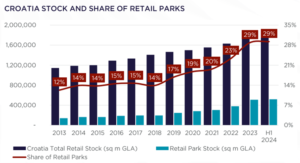In today’s global economic environment, increasing emphasis is placed on sustainability, responsibility, and business transparency. Several key challenges arise for companies when implementing ESG strategies, particularly when it comes to construction and renovations of real estate, said Predrag Tutić MRICS, Partner at CBS International, member of the Cushman & Wakefield Alliance, in an interview for Diplomacy&Commerce. Additionally, Mr. Tutić discussed the challenges in the real estate industry, market development, and Croatia’s advantages compared to the region and Western Europe, as well as the representation of investments and construction in Zagreb itself.

- CBS International is a leading company in the region and this part of Europe when it comes to real estate. How do you assess the year 2024 in terms of real estate market development in Croatia? Where does Croatia stand compared to its surroundings, and which countries could we compare it to in terms of the real estate market?
The sectors that attracted the most investment were logistics, followed by the office space market, with three office buildings sold in Zagreb, which has once again placed a strong focus on this sector. When we compare Croatia to neighboring countries, we see that we still have an advantage and significant interest from foreign investors in hotels and generally in the development of new tourism projects, and we expect this trend to continue in the coming years. Additionally, other sectors will also be in focus for the development of new projects, such as the office space market and the logistics sector, which still holds great potential, though it is somewhat dependent on infrastructure development, specifically the Port of Rijeka and the modernization of the railway system. It is important to note that Croatia still offers very good returns on commercial real estate compared to some larger markets in Western Europe. It is a stable and liquid market, which has recently also attracted a greater number of domestic investors to turn to such investments.
- As the business center and capital city, Zagreb stands out from the rest of the country, including the coastal areas. How prevalent are investments, construction activities, and what is the availability of office space and land on the market? What can we expect regarding prices?
Zagreb has 1.55 million square meters of office space, making up 90% of the total market in Croatia, and all of the new developments totaling 100,000 square meters will be in Zagreb. However, when we look at the development of new retail spaces, particularly retail park formats, we see greater development happening in secondary locations and cities. In the coming years, the development of new hotel facilities will be more focused on the coast, in areas like Zadar, Split, and Dubrovnik, where we will finally see new developments featuring top global brands. As for rental prices in commercial real estate, they have increased by 10% over the past year due to high demand, with a vacancy rate below 2% across all sectors. Land prices have also risen and are expected to continue growing because, unfortunately, urban development and the planning of new spaces in Zagreb are very limited. As a result, the currently available land suitable for construction is extremely attractive.

- Lease renewal services have become increasingly popular in the real estate industry to help landlords and tenants simplify the leasing process and maximize their benefits. Why are lease renewal services beneficial for clients, and what advantages do they offer in real estate transactions?
Yes. In Croatia, lease renewal services have become increasingly popular among our clients, which is a standard practice in Western markets that many international companies typically utilize. Our clients benefit primarily from having a professional team that negotiates new lease terms on their behalf and compares them with market standards. This process helps identify optimization opportunities during contract extensions, which can bring specific benefits to the client, such as reducing risks associated with unfavorable terms or conditions in the contract. Ultimately, this ensures an optimal agreement for both parties and fosters a long-term, quality relationship between the tenant and the landlord.
4. What do you see as the biggest challenges in your industry and how can they be addressed?
The biggest challenges for our industry are directly related to the development of the real estate market in Croatia, primarily the lack of new projects. The cause of this is the slow development of infrastructure, very poor urban planning, and a lack of clearly defined city strategies, leading to disjointed and ad-hoc construction. Unfortunately, local authorities have yet to embark on a long-term solution to this problem, which includes social benefits, ecological sustainability—currently a top global issue—and essential economic development and sustainability. To address these challenges, it is crucial to involve experts from all relevant fields.
5. In today’s global economic environment, there is an increasing emphasis on sustainability, responsibility, and business transparency. ESG, which stands for environmental, social, and governance factors, has become a key indicator for assessing the success and long-term value of companies. From your extensive experience, what challenges do companies face when implementing ESG, and how does this impact their operations, particularly regarding the construction and renovation of real estate?
The first challenge relates to compliance with regulations and standards, which often change or vary by market. Companies must be proactive and continuously monitor changes to ensure compliance with the latest requirements, which can be complex and costly, especially for large projects involving multiple phases or locations. The second significant challenge is linking sustainability with financial outcomes. The third challenge lies in transparency and reporting on ESG results. Standardized reporting is still not fully developed, and companies often struggle with how to quantify and communicate their achievements. Regarding construction and renovations, ESG criteria increasingly influence design, material selection, and resource usage. There is growing pressure to certify buildings according to standards such as DGNB, LEED, or BREEAM, which can enhance the market value of properties but requires additional resources and expertise.